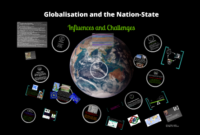The State and Globalization
The State and Globalization
With the Westphalian Treaty of 1648 states came to honour the mutual benefits of allowing each other the right to control their own territories. The crucial claim of the state over society thus came from ‘outside’, it was decided that states will not interfere with each other’s sovereign rights to govern its citizens. This was true for all states, be it liberal, democratic, authoritarian or any other. Sovereignty in its modern distinctive nature is the ‘exclusive control of a definite territory’ (Hirst & Thompson: 1999, p. 256).

Over the years various challenges have threatened to erode the sovereignty of the nation-state. Till the end of the Second World War, such threats more often used to come from below i.e. from within the state itself. Dissident voices, sub-national movements, nascent nations developing inside a state etc. pulled the sovereign legitimacy of the state into a vortex of internal commotion. Such anti-systemic threats were mostly direct answers to the colonial rule and manifested themselves as outcomes of political and territorial domination. With the end of the Second World War the modern state started to advance its capabilities as the ‘container’ of the civil society in all its aspects of economy, polity and culture. It was based on the principle of territoriality—its ‘physical expression’. Through territoriality the state distinguished between the presence of ‘inside’ and ‘outside’ (Brenner 1999). The borders configured space and were co- existent with the territorial supremacy of the state. This ‘bounded space’ was the domain of the state’s activities, rules, laws, associations, principles, regulations and the like. Within this domain it served everyone equally and tried to meet the demands of everyone. It also realised that with the increasing demands from both the domestic society and the international society, responsibilities were needed to be shared or delegated to other organisations, associations working beneath the level of the state. So the modern state retained the classical functions of protecting its citizens from harm, both externally (sovereignty) and internally (a stable civil society), maintaining a fully functional economy which grants rights to its individuals and to provide justice for all. But above all, the state abstracted all the contingent identities of an individual, which stretched for example from being a man, to a father, a husband, an office worker, a friend etc. by collapsing all these into a single identity of citizenship. You derive your rights, your pensions, your profits, your health insurance etc based on the rigid fact that you are first and foremost the citizen of a state which legitimates the constitution which gives you the rights, accepts the license for the employer who gives you the pensions, help run the stable market which assures your profit and so on. Thus by the 1960s the state became the supreme socio-political entity (Hirst & Thompson: 1999). In the advanced western countries it was widely felt that continuance of national economic management through uniform and organised services in health, education, welfare etc was essential for the sustenance of full employment and growth (Hirst & Thompson: 1999). However, such Keynesian macroeconomic services were found wanting with the demise of the welfare-state (Bhattacharjee: 2006). The functionality of the welfare state came under immense scrutiny with the new Right calling for the rational market forces to ride over the irrationality of bureaucratic state interventions (Bhattacharjee: 2006). With the collapse of the Soviet bloc similar assertions were forwarded to the concept of state itself as the whole world became ‘open’. States, which were cautiously following the power blocs disentangled themselves from the Cold War era of veiled governance. By the mid 90s, along with the rise of the processes of globalization through increased trade, investments, post-Fordist production mechanisms (Kumar: 1995), and advanced telecommunications etc. the supremacy of the state, or even its necessity in the modern world was put to perspective. Many debates have taken place in order to posit state in the recent globalizing world affairs which have questioned the legitimacy of the state to order societies when the distinctive territorial demarcation to underline the beginning of a state’s sovereign power has lost its meanings. The following section traces the most vibrant of such claims.
3.1 The Dead State?
Debates involving the reasons behind and nature of the modern state’s demise are not new. According to Scholte (1997) state-redundancy theories have been in debate from early twentieth century. Modern theorists who advance the collapse of the state theory come mostly from a non-political academia. Public policy analysts like R. B. Reich (1991) and management theorists like Kenichi Ohmae (1995) are the chief proponents of the scaling down of the state’s activities. From within the discipline itself British political economist Susan Strange (2003) was pivotal in underlining the ‘hollowing out’ (Strange, cited in Douglas, 1997) of the state in the globalising age. Ohmae calls the nation-state a ‘nostalgic fiction’ which nowadays has lesser contributions to make as the freedom to contribute has been taken away from it (Ohmae: 1995, pgs. 11-16). Almost all redundancy theorists have based their arguments on similar observations and follow a remarkable structural parity. They have looked at the modern state from such vantage points as the rise of the non-state actors, the inevitable force of global finance resulting in the deterritorialization of the increasing ‘borderless world’ (Ohmae: 1990), the fragmentation of the central authority of the state aiming towards a global society, advanced communications undermining the state’s controls etc (Douglas: 1997). What is common in all these claims can be grouped under the following sections.
3.1.1. COMPUTER AND TELECOMMUNICATIONS REVOLUTION
Technology has become widely accessible. The de-monopolisation of the use of the technology by the government to gather large amounts of information have been crucial in its demise (Mathews: 2002). Today, computers are not the prerogative of the wealthy and influential. It’s the basic necessity, the way of connecting with the globe, the rest. Internet usage has increased rapidly facilitating this global exchange of information. Castells showed that from 14 million users in 1995 the number of users went up to 400 million users in 2001 and predicted that by 2005 it will reach 1 billion (cited in Urry, 2005: 246-7). According to the latest data released by Internet World Stats, 17.85% of the world’s population, amounting to approximately 1.1 billion people have been penetrated by the reach of the Internet, which is a 225.0% increase from 2000 (Internet World Stats 2007). This phenomenal growth however is supplemented by some interesting figures which show that 37% of the users are from Asia (see Appendix: Figure 1) but ironically that is only 12% of Asia’s population (see Appendix: Figure 2). In terms of population penetration North America has achieved the largest penetration with 69% of its population using internet, followed by Australia/Oceania and Europe. Mathews argues that internet, satellite communications, fax machines etc are carriers of technology which reduce distance and the ‘importance of proximity’ resulting in societal divisions (2002, 204).
3.1.2. INCREASE IN TRADE, INTERNATIONAL FINANCE AND MULTINATIONAL PRODUCTION
Extreme globalist writers like Ohmae (1990) and Reich (1991) argue that global markets have become totally integrated and connected. Multinational corporations have free reign over their entrance and participation in the domestic markets. Non-tradable goods and services are also marketed by multinational organisations as production has ceased to be localised and national (Perratton & Goldblatt: 1997). But globalization sceptics often argue about the myth of increased international trade. Such authors (Hirst & Thompson: 1999; Gilpin: 2002 ) argue that the amount of global flows involved during the classical Gold Standard Period circa 1870-1914 have been matched but not surpassed by modern trade flows. But recent studies have shown that as much of the post-war GDP growth in industrialised countries had been in non-tradable services, mostly public services, the ratios of trade to private sector GDP (as a proxy for tradable GDP) has surpassed Gold Standard ratios by the 1970s (Perratton & Goldblatt: 1997). Such an increase in global trade coupled with the flow of unregulated global finance resulting from the collapse of the Bretton Woods system and the concomitant origins of floating exchange rates were the chief reasons behind the state’s alleged demise. With the rise of MNCs, FDIs have also increased from $192,682 million in 1990 to $572,774 million in 2001 (Source: Global Financial Flows, 2005. List-6.7). Such increases in FDIs tend to underline the fact that states are no longer immune from international exchanges. Today, the greater the amount of FDI a country can attract reflects its market and political stability towards foreign investors. As Strange (2003: 132) points out,
“(T)o the extent that attention is paid at all to the institutions creating and marketing credit in the world economy, they are held to be important chiefly for the increased volatility they may cause to exchange rates, or to the impact they may have on the ability of governments to borrow abroad to finance development or the shortfall between revenue and spending, or between export earnings and import bills.”
3.1.3 RISE OF NON‐STATE ACTORS
Non-state actors range from NGOs to terrorist organizations. Even criminal groups working inter-nationally do not belong to any specific state. NGO’s roles have exploded in the last ten years. They have grown from around 200 in 1909 to over 17,000 in 2001 (Krasner, 2001: 25). Today, NGOs generate ideas, mobilize public support, do social analysis, welfare work and a host of other activities which the state find increasingly hard to handle as such activities are hierarchically so weakly positioned. For example, NGOs can help create and sustain year-long water supply to the remotest of villages which the state cannot reach or can choose to ignore. According to Mathews (2002: 205) today NGOs ‘deliver more official development assistance than the entire UN system’. On the same vein terrorist organizations cannot be traced down to any single country. They have bases all over the world and do not stay confined to any state- boundary for maximum reach and scope of their activities creating a “security problematique” (Spruyt, 2002: 143). This undermines the power of the state as well.
Such are the claims of the state-redundancy theorists where a shift in power from the state to the market-society is imminent. States are dying even as we speak. However, no discipline would like to relinquish its core concept and discard it to the garbage of history and the subject of International Relations is no exception. States have always been the major point of interest as politics essentially originates at the top: the state, and is substantiated and consolidated at the bottom: society. To say that states are needless in the present world would render the discipline redundant. Thus, it is only logical that political economists would talk about the market overtaking the state; sociologists would argue that a transcendental trans-national society is in the making which would supersede the state and so on. The study of ‘inter-national’ relations is about the states and their relations in an international framework. Taking the state away from it would result in an academic vacuum. But this also doesn’t mean that the discipline would sacrifice all arguments in order to proclaim the supremacy of the state. Globalization theorists, as argued earlier, are divided on what they believe is happening. The sceptics would believe that there is nothing new about the process and thus, the state have nothing new to fear albeit structural adjustments are needed to accommodate changes (Hirst & Thompson: 1999). But such adjustments have been essential to the state’s survival through the period of its modern-day existence. Globalists would further the market economy approach of the orthodox liberal- institutionalism and point out the tragedy of the ‘container of the society’ as no longer being suited to run as the chief machinery. The free market which has transcended borders, has given us ‘floating capital’, has shown us the path of the invisible ‘hot’ money such as stocks, bonds, shares etc all of which do not follow any state regulations. But first we need to see how states actually have responded to globalization and why many scholars so passionately believe that states are still powerful.
3.2 The Powerful State
Numerous international relations theorists have forwarded their claims for the state’s survival. ‘Bringing the state back in’ to the discipline has seen a major thrust in the three decades following Nettl’s classic 1968 article-“The State as a Conceptual Variable”, where he argued that the institutional centrality of the state or its ‘stateness’ needed more attention as it differs from nation to nation (Evans 1997). Studies about the survival of the state resurrected again after the end of the Cold War with the global interconnected markets and capital questioned whether the state has lost its authority and autonomy internally in making decisions about such issues as taxation, income redistribution and other macro-economic policies as fixing exchange rates etc. (Wolf 2001). Scholte (1997) observes that on the contrary, modern states ‘enable’ globalization to foster by creating the basic framework of rules for the market on which depends the success of the globalizing market forces. According to Scholte (1997: 441- 2) the state constructs ‘property guarantees, investment codes, currency regulations, tax regimes, labour laws and police protection’ for global firms to enter the national market and develop its market base and also, by ‘removing exchange controls, passing legislation for offshore facilities…allowing non-resident ownership of bonds and equities’ etc. help structure the framework of regulations under which non-territorial global finance can perform. By comparing with earlier reactions of states to common existing problems of higher unregulated trade, movement of goods and men Krasner (2001) argues that states today are better prepared now than they were before in handling such threats and problems. He argues that the present day world recovered much faster and more efficiently from the Asian financial crisis than it did from the Great Depression which resulted in an ‘international collapse of credit’ (2001: 24). Wolf (2001: 189) also believes that ‘the constraints imposed on (or voluntarily accepted by) governments by globalization are, on balance, desirable’. Economic integration, riding on the trade theory of comparative advantage increases meaningful competition to which the states gladly concede to portray their commitments towards fostering and perpetuating such sectors. In the same vein, entering into international treaties creates binding responsibilities—accepting which, states emphasize their private-sector leanings. Also, to take advantage from such international economic integration, the society needs a broad range of assured public goods as property rights, basic education, strong legal frameworks, personal security (Wolf 2001), quality health system and so on—which can only be provided by the state. Moreover, the sense of identity emanating from the state can never be supplanted by a state-free international society. A loss in the sense of immediate security would propel international society back to the state-system. Further, international order rests on the individual state’s power to monopolise and exercise coercion within its territorial demarcation. Cyberspace, invisible monies, finance capital etc can never change this.
What is important is to identify the correct changes that have taken place or are still happening and not to over emphasize and generalize such transformations into an overall declinist state-thesis. Spruyt identifies this problem and differentiates between the decline of the state’s autonomy and changes in the ‘institutional logic of territorial sovereignty’ (2002: 142). The latter remains strongly grounded to the discourse of political science. Seen in terms of ‘hard’ geo-politics of international belligerence states have managed to keep its legitimacy intact. Post-nuclearism, involving scaling down of mass-mobilization warfare tended to diminish the classical role of the state, just as the prospect of nuclear warfare threatened its political existence (Mann, 2003: 135). Nuclear weapons made statist theories obsolete as states found it impossible to protect themselves from the devastative power of such weapons (Spruyt 2002). Still, with the help of international doctrines of nuclear weapons usage and non-proliferation the substantive threat of total annihilation from such weapons have been curtailed. Thus, again states resorted back to the precision-warfare which involves mobilization and is not essentially pyrrhic. Traditional alliances still retain their classical realist supremacy over other supra-national or multi-lateral forces. Modern day warfare increasingly researches on urban placement and locality oriented attacks as the invasion of Iraq proved. Thus, even in military terms the state has retained its legitimacy as the protector of domestic security (Tarrow, 2001: 3). There are still reasons for its existence.
The key argument here is that transnational organizations, post-industrial capital, regional institutions, NGOs etc have indeed restructured the scope and authority of the state. Thus, when we look at globalization from the point of economy the state indeed seems to be in a spot of bother, albeit not so much as to herald a state-free transnational society. But what holds the idea of state together is its construction of territorial culture. Culture is time and space based; it is not diffused through an invisible sieve. Even when sharing similarities with others over the space-less existence of internet, cultures retain their specificity. Cultures mix, adapt, develop and change but never evaporate. It is manifested through the political behaviour, the military strategy, the economic policies and the social exigencies of the state. The state is powerful not because it can still impose taxes, or it can fight wars or open-up borders for other companies to come in; it’s powerful because it has the strength of its culture to propel it forward. A state which is embedded in its culture can counter the globalizing trends of diminishing authority and questionable legitimacy. The following chapter discusses this concept with reference to the Indian subcontinent and show how the world’s largest democracy has retained its stateness in an era of globalization.



